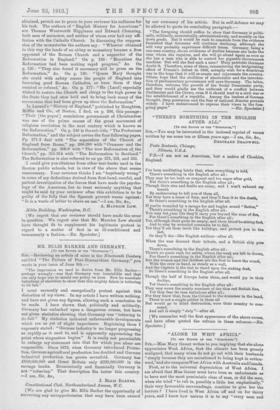"THE AMERICAN PEOPLE."
[To THE EDITOR OF THE "SPECTATOR."] SIR,—In reviewing the second volume of "The American People" in your issue of April 27th your reviewer said :- " People think of the Roman Church with some dim and con. fused recollections of Americanism' as having suffered a sea change in crossing the Atlantic. They may be surprised to learn, not only that it has not abated one jot or tittle of its claim to dominate the conscience and intellect of men, but that wherever —through the Irish, Italian, or Catholic Slav vote—it has the power to do so, it effectively asserts this claim.. Boston, once the American Geneva, is now a Roman Catholic city from the text- books of history used in its public schools all mention of the Reformation is excluded."
Here is what purports to be a statement of fact—that no mention is made of the Reformation in the text-books used in the public schools of Boston, and your reviewer is either justified in making it because the facts sustain him, or he has deliberately perverted the facts. Now what is the truth?
I have before me "School Document No. 13, 1911. Boston Public Schools. List of authorized text and supplementary books. School year 1911-1912," officially issued by the city, and on page 38, under the heading " History, Mediaeval and Modern," the following text-books are listed : Higginson and Channing's "English History for Americans," Larned's " History of England," Bourne's " Mediaeval and Modern History," Cheyney's "History of England," Cheyney's " Industrial and Social History of England," Green's " Read- ings from English History," Green's " A Short History of the English People," &o.
Yom• readers have easily accessible Green's works, so I need not encroach on your space to cite the pages where mention of the Reformation can be found ; but as some of the text- books written by Americans are less convenient' to he obtained, permit me to prove to your reviewer his unfitness for his task. The authors of "English History for Americans" are Thomas Wentworth Higginson and Edward Charming, both men of eminence, and neither of whom ever had any affi- liation with the Catholic Church. In discussing the suppres- sion of the monasteries the authors say : " Whoever obtained in this way the lands of an abbey or monastery became a firm opponent of the Roman Church and a supporter of the Reformation in England." On p. 120: "Meantime the Reformation had been making rapid progress," (tc. On p. 126 : " They also found it necessary still to press on the Reformation," &o. On p. 130: " Queen Mary thought she could with safety coerce the people of England into becoming good Roman Catholics, or burn them if they resisted or refused," &c. On p. 177: "He [Laud] especially wished to restore the Church and clergy to the high power in the State they had once held and to bring back many of the ceremonies that had been given up since the Reformation."
In Lamed's "History of England," published by Houghton, Mifflin and Co., of Boston, I find, on p. 206, this passage : " Their [the popes'] scandalous government of Christendom was one of the prime causes of the great movement of religious revolution in the next century which is known as the Reformation." On p. 249 is the sub-title, " The Protestant Reformation," and the subject covers the four following pages. Pp. 271-3 deal with " The separation of the Church of England from Rome," pp. 288-290 with " Creamer and the Reformation," pp. 306-9 with " The new Reformation of the Church," pp. 311-314 with "The Reformation in Scotland." The Reformation is also referred to on pp. 275, 331, and 332.
I could give you citations from other text-books used in the Boston public schools, but in view of the above that seems unnecessary. Your reviewer thinks I am "hopelessly wrong" in some of my deductions derived from first-hand, careful, and patient investigation of the forces that have made the psycho- logy of the American, but to treat seriously anything that might be said by your reviewer after this exhibition is to be guilty of the folly that the Spanish proverb warns against: " It is a waste of lather to shave an ass."—I am, Sir, &o., A. Kaunien Low. _Hibbs Building, Washington, D.C.
We regret that our reviewer should have made the error in question. We regret also that Mr. Maurice Low should have thought fit to supplement his legitimate protest in regard to a matter of fact in so ill-conditioned and unmannerly a fashion.—ED. Spectator.]











































 Previous page
Previous page